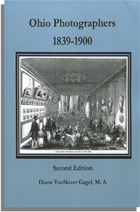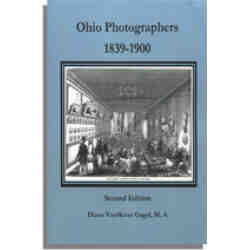This magnificent work traces the development of photography in the State of Ohio from 1839 to the end of that century. Compiled and written by archivist and genealogist Diane VanSkiver Gagel, it also details the lives of hundreds of Ohio photographers who practiced their art, beginning with the introduction of the daguerrerotype in Ohio by Professor John Locke of the Medical College of Ohio. Ohio Photographers, 1839-1900 thus provides a context for more fully integrating the visual, written, and oral records that comprise Ohio’s history.
Ms. Gagel presents her subject in six parts. First comes an essay describing the history of early Ohio photography. Here we learn about the evolution of photographic technology and its materialization in the major cities of Cleveland, Cincinnati, Columbus, Dayton, and Toledo. Next comes hundreds of biographical sketches of Ohio photographers, many of them illustrated, which frequently trace the photographer’s family for two or more generations. A number of these practitioners would achieve celebrity in their chosen field, including the Virginia-born, African-American James Pressley Ball Sr. and his son James Jr., who built their careers in Ohio before ultimately moving on to Montana. The third and longest section of the work, a directory of Ohio photographers, names about one thousand 19th-century Ohio shutterbugs, giving the location(s) of their studios, how many years they were in business, and sometimes more. Culled from city directories, state and local histories, and other sources too numerous to name here, the directory is the best list of 19th-century Ohio photographers in existence. The final three sections cover writings by or about Ohio photographers, pictures of actual studios, and an extensive bibliography.
This edition of Ohio Photographers, 1839-1900 represents a marked expansion of its 1998 predecessor. Nearly three times longer than the first edition, it demonstrates the mercurial appeal of this new profession among persons of varying nationalities, social classes, educational backgrounds, and so on. Ohio Photographers, 1839-1900 is also a beautiful book, reflecting Ms. Gagel’s abiding interest in her subject, one no doubt inspired by watching her photographer father at work. It will appeal to genealogists searching for Ohio and/or photographer connections and students of Ohio history and photography alike.


